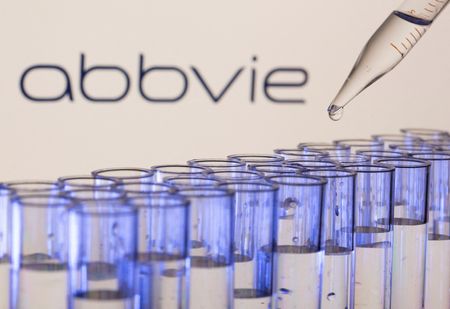 1
1 1
1
By Patrick Wingrove
(Reuters) – Cheaper versions of one of the most costly and widely used arthritis treatments in the U.S. are likely to fuel further scrutiny of the middlemen that negotiate drug prices for most insured Americans from lawmakers and the federal government, according to healthcare experts.
Seven drugmakers this month launched their own versions, known as biosimilars, of AbbVie’s flagship arthritis drug Humira, once the world’s top-selling prescription medicine. Three have kept their list price within 5%-7% of AbbVie’s, two priced at an 85% discount and two have offered both types of prices.
Once several competing versions of a drug become available prices tend to plummet, although less so with complex biotech drugs like Humira. Traditional generic pills that are exact copies and easily produced can quickly drop prices by 90% or more. Other biosimilars have had price cuts of around 50% on launch, according to data from the Association for Accessible Medicines trade group.
“That list prices of Humira and its biosimilars remain high even with robust competition should fuel calls to reform our Byzantine, dysfunctional pharmaceutical supply chain,” said Ameet Sarpatwari, a professor and drug pricing authority at Harvard Medical School.
For insured patients who are often on the hook for co-pays of 10% to 25% of the list price, the savings have been minimal.
The Biden administration has made lowering drug prices a priority. It passed the first U.S. drug pricing legislation ever in the Inflation Reduction Act last year, and has since turned its sights on these middlemen, known as pharmacy benefit managers (PBMs).
Lawmakers and the Federal Trade Commission (FTC) have been investigating the role of PBMs in rising healthcare costs. Several bills are in the works that would require them to make their business dealings public, including the fees they earn on transactions.
The FTC last week withdrew past statements suggesting that forcing PBMs to disclose their dealings would undermine their ability to lower healthcare costs, adding that the industry has changed since then.
The three biggest PBMs, CVS Health’s Caremark, Cigna Group’s Express Scripts, and UnitedHealth Group’s Optum RX, declined to comment.
PBMs say they play an important role in holding down drug costs for their clients, including employers and health insurance plans, and that most after-market discounts go to their customers.
‘AN OPAQUE OPERATION’
Amgen called attention to the middlemen when it launched Amjevita, the first approved near copy of Humira, in January. It set two prices for its version, saying PBMs prefer a higher list price from which they garner after-market discounts. In return, drugs receive a low co-pay or other preferable coverage terms.
Amgen offered 5% and 55% discounts to AbbVie’s $6,922 per month Humira price tag, and both were included on drug coverage lists at two large PBMs.
In the subsequent nearly three months, only 9% of all patients that used the drug had gotten the lower priced version, according to industry trade group Biosimilars Forum.
Healthcare experts say that trend could continue even though Express Scripts and Optum RX added both the high- and low-priced biosimilars from Novartis’ Sandoz unit to their coverage this month.
It also could take years for current proposals to result in meaningful savings for consumers, experts on the U.S. healthcare system say. Stricter rules on how these companies can operate, including restrictions on how they determine charges and a possible reimagining of their business model, would help, they said.
Law professor Robin Feldman from University California College of the Law, San Francisco, said some legislative proposals, like one from Democratic Senator Ron Wyden on how PBMs determine their fees, could make a dent provided they stop the companies from making up lost revenue elsewhere.
The U.S. government spent about $9 billion on Humira in 2021.
“The basic challenge here is PBMs made a lot of sense 30 years ago,” Wyden said. He told Reuters this month that PBMs should release more detailed information about how they operate.
A bipartisan bill in the works led by Republican Senator Chuck Grassley would require PBMs to report to the FTC payments received from health plans and fees charged to pharmacies.
Earlier this month, Grassley told Reuters the PBM system was “an opaque operation. Transparency brings accountability, and there’s no accountability.”
“Who gets the benefit of the rebates?” he asked. “In most cases you’ll find out that local pharmacists and consumers don’t benefit much from it.”
(Reporting by Patrick Wingrove in New York; Additional reporting by Moira Warburton and Josephine Walker in Washington; Editing by Caroline Humer and Bill Berkrot)